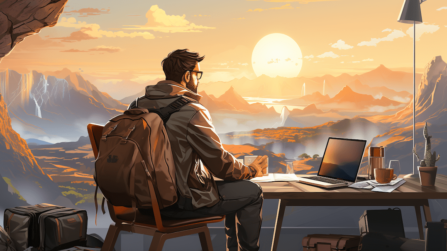Jet lag happens. But quality sleep shouldn't be left behind.
Flying through multiple time zones can throw off your circadian rhythms like a rollercoaster ride rattling your insides. One day you're sitting on a Barcelona beach watching the sunset, the next you're staring blankly in an office in Shanghai at what your body still swears is 2am.
While jet lag is inevitable for globe-trotting digital nomads, disrupted sleep doesn't have to be. By optimizing your sleep hygiene - that is, your sleep environment and daily habits - you can minimize restless nights and arrive refreshed and ready to seize the day, no matter what time zone you're in.
The key is consistency. Maintain a regular sleep schedule tethered to the solar cycle, while making small adjustments to match your new location. Dim your lights as evening sets in, avoid electronics before bedtime, and establish a relaxing pre-sleep routine. Choose overnight accommodations wisely, opting for blackout curtains and minimal noise.
With some discipline and preparation, you can maintain healthy sleep patterns amidst the excitement and discontinuity of nomadic life. Wake up recharged and ready to fully experience all that your new destination has to offer. Don't let jet lag steal your energy and vibrancy. With good sleep hygiene, you can have the best of both worlds - deep, restorative rest and bold, boundary-pushing adventures.
The Key to Conquering Jet Lag
Adjusting your internal clock across time zones is no easy feat. But with diligent sleep hygiene, you can minimize the dreaded symptoms of jet lag.
The problem is that our circadian rhythms take cues from external factors like sunlight to regulate our natural sleep-wake cycle. When the time suddenly shifts, like when you fly halfway across the world, our internal clocks get seriously confused.
This circadian rhythm disruption manifests through classic jet lag symptoms like insomnia, fatigue, trouble focusing, and just feeling generally lousy. Not an ideal state when you want to be out exploring an exciting new destination.
The good news is, you can take steps to help your internal clock align with the new time zone more quickly:
- Stick to your regular sleep schedule as much as possible, with gradual adjustments to match the solar cycle in your new locale.
- Seek out natural light in the mornings and avoid bright screens at night. This helps calibrate your rhythm.
- Establish a relaxing pre-sleep routine, like reading or taking a warm bath.
- Opt for minimal noise and total darkness when sleeping. Blackout curtains and noise-canceling headphones work wonders.
With diligent sleep hygiene starting even before you travel, you can conquer jet lag and avoid the brain fog that comes with a disrupted circadian rhythm. You'll arrive at your destination feeling refreshed, revitalized, and ready to fully experience all the thrills of nomadic life across time zones.
Outsmarting Your Internal Clock
Your brain's internal clock is a force to be reckoned with. Like a strict school teacher, it wants to keep your sleep schedule in check. But with some clever hygiene habits, you can bend those rigid circadian rhythms to your will.
Here's the deal - your suprachiasmatic nucleus takes cues from sunlight to regulate the natural 24-hour patterns that determine when you feel sleepy or alert. When it's dark out, your SCN tells the brain it's time to start pumping out melatonin to usher in sleep.
This internal clock serves you well when life is routine. But the disruptions of nomadic life can throw it totally out of whack. That's when you feel the turmoil of jet lag or just general sleep dysfunction.
The good news? You can hack your circadian rhythms with a few simple tricks:
- Strategically expose yourself to sunlight and avoid blue light from devices at key times to coax your SCN into aligning with your new time zone.
- Stick to consistent sleep and wake times linked to real solar cues, not just the clock.
- Avoid caffeine, alcohol and heavy meals before bed, which can mess with your internal signals.
- Establish a relaxing pre-sleep routine to wind down each evening.
With practice, you can override your rigid internal clock and establish healthy sleep in any time zone. Outsmart your circadian rhythms and seize control over your sleep schedule like the empowered nomad you are!
Hacking Your Brain's Sleep Switch
There's a tiny region in your brain playing puppet master with your sleep patterns - the suprachiasmatic nucleus. This powerful SCN acts as your internal clock, controlling the circadian rhythms that dictate when you feel alert or drowsy.
Here's how it works its magic:
The SCN soaks up signals about sunlight exposure through your eyes, helping synchronize your natural 24-hour sleep-wake cycle with the outside world. When that morning sun hits your face, your SCN flips the switch to "awake mode" and starts suppressing melatonin to keep you energized.
As sunset approaches, the SCN kicks into gear again, boosting melatonin to usher in sleepiness. This daily dance between light and dark makes the SCN a master regulator of healthy circadian rhythms.
Of course, us nomads don't live such routine solar cycles! All that globetrotting disrupts the SCN, leading to the dreaded jet lag when your internal clock is out of sync.
The good news? You can hack your SCN to adjust to new time zones. Strategic light exposure, consistent sleep schedules, and a peaceful bedtime routine can help realign that internal switch. Outsmart your SCN jet lag!
In summary, the brain's SCN acts as a natural sleep switch based on light cues. By understanding and respecting this internal clock, we can tweak our habits to maintain healthy sleep in any time zone. It's empowering to harness the power of your own inner sleep regulator!
Let the Sun Be Your Guide
Morning rays seeping through curtains. The amber glow of sunset. This natural dance of light and dark is your circadian rhythm's symphony conductor.
Exposure to the sun's energizing beams during the day keeps your internal clock precisely ticking. This bright light signals your brain to pump up alertness hormones like cortisol and tamp down melatonin. You feel refreshed and revitalized.
As the sun dips below the horizon, dimming those all-important light cues, your pineal gland goes into overdrive producing sleep-inducing melatonin. Your body begins preparing for rest.
By taking your sleep and wake times straight from Mother Nature's daily solar rhythms, you can maintain a robust circadian beat even as a nomad. Going to bed and rising at consistent times aligned with nightfall and dawn keeps your inner clock in tune.
If you ever feel jet lag knocking your circadian rhythms off-kilter, light therapy could help get you back on track. Mimicking the sun with specialized bright light devices tricks your brain into readjusting its sleep signals. What a natural remedy!
In our modern world, artificial light at night can disrupt those beneficial natural cues. But by dimming electronics and devices as the sun sets each day, you can preserve your innate circadian rhythms wherever you roam.
Dimming the Digital Glow
Scrolling through your feed as the moon rises. Binge-watching your favorite show at 2am. The siren glow of screens disrupts your circadian rhythms in sneaky ways.
The culprit is blue light. This high-energy wavelength, emitted heavily by electronics, suppresses melatonin and tricks your brain into thinking it's daytime when it's actually time for bed.
Your device addiction can also keep your mind wired and engaged when it needs to unwind. Double whammy to healthy sleep!
While the science is still unresolved, the negative effects of blue light and stimulating content are clear. To avoid this digital disruption:
- Minimize screen time before bed, especially in the 1-2 hours before you hit the pillow.
- Install apps to filter out blue light from devices in the evenings.
- Switch your bright overhead lights to softer, warmer night lights.
- Never scroll in bed - keep the bedroom a sacred sleep space.
During the day, seek out natural sunlight, the healthy counterpart to artificial light. With some diligence, you can circumvent those sneaky sources of circadian disruption.
Jet Lag's Wrath
You just stepped off a 10-hour flight, bleary-eyed and weary, ready to seize the day in an exotic new destination halfway across the globe. But uh oh...jet lag decides to unleash its fury instead.
Some of the lovely symptoms you may experience include:
- Extreme fatigue, yet also insomnia when you desperately need rest
- Mental fog and difficulty focusing or absorbing new information
- Mood changes and irritability that have you snapping at poor unsuspecting locals
- Headaches and digestive issues that hinder your ability to enjoy the local cuisine
- Tossing and turning as you struggle to fall asleep on local time
This jet lag wrath all stems from the mismatch between your internal circadian rhythm and the actual solar time of your new locale. All those neatly regulated signals in your brain get totally knocked out of sync.
While jet lag's effects are temporary, those days of misery can really hamper your experience of an exciting destination.
The good news? With a few pro travel tips, you can minimize jet lag's wrath:
- Gradually adjust your sleep schedule before departure
- Seek out sunshine and avoid screens at key times
- Hydrate frequently and avoid excessive caffeine and alcohol
- Stick to consistent sleep and wake times in your new locale
Take that, jet lag! With diligent sleep hygiene, you can conquer those disruptive symptoms.
The Perils of Sleep Deprivation
Bleary eyes and foggy brains plague the sleep deprived. Disrupted rest wreaks havoc in sneaky ways.
Without adequate shut-eye, your critical thinking crumbles. Judgment, attention, memory - all impaired. You stumble through decisions in a mental haze.
A tired body mirrors the exhausted mind. Deprived of rest, your immune system falters, leaving you prone to illness. Hormones go haywire, spiking hunger and hindering muscle recovery.
The longer sleep deprivation drags on, the worse the effects. Stress and anxiety skyrocket. Irritability sets in. Even physical discomfort and pain sensitivity rise.
Chronic sleep debt is the ultimate productivity killer too. You struggle to concentrate, process information, and problem-solve. Mental performance plummets.
Clearly, skimping on sleep is no trivial matter. Prioritizing consistent, sufficient rest is crucial for cognitive clarity, emotional balance, and physical health.
As digital nomads, we occasionally push through all-nighters or marathon travel days. But regularly shortchanging sleep invites long-term peril.
Let's respect our mind and body's fundamental need for restoration. With commitment to healthy sleep hygiene, we can thrive in top form - the ultimate goal of our boundary-pushing lifestyles!
Mastering Sleep as a Global Nomad
Jet-setting across time zones, yet waking up refreshed - here are 5 tips to make it happen:
🛬 Gradually adjust your sleep schedule before and during travel to align with the new time zone. Consistency is key!
☀️ Soak up sunshine when it's daytime at your destination and dim lights from dusk 'til dawn. These natural light cues reset your inner clock.
🌙 Minimize electronics use at night. Blue light delays sleep onset by suppressing melatonin.
🛌 Optimize your sleep setup. Block out noise and light completely. Keep temperatures cool for optimal rest.
💆 Establish a relaxing bedtime routine to unwind each evening, like reading or meditating. Avoid stimulants close to sleep.
Sleep is a trip that requires planning too! By tailoring these simple but diligent sleep hygiene habits to the unique demands of nomadic life, you can thrive across time zones.
As your mind and body traverse the globe, be sure to care for their fundamental need for restoration through healthy sleep. The adventure continues when you wake up refreshed, inspired, and ready to make each day count, no matter where you roam!
Healthy Sleep is Always In Style
As digital nomads traversing the world, our passion for adventure across cultures and time zones is unparalleled. Yet amidst all the excitement, we must remember to care for our minds and bodies through a fundamental human need - restorative sleep.
By tailoring simple yet diligent sleep hygiene habits to the unique demands of nomadic living, we can maintain circadian alignment no matter how many time zones we cross. Gradually adjusting our sleep schedules, seeking out natural light during the day, and establishing relaxing evening routines allows us to thrive energetically and engage fully with each destination.
Sleep is the ultimate travel necessity. With a commitment to healthy rest, we ensure our mental clarity, cognitive performance, and overall wellbeing never take a backseat to our global pursuits.
The world awaits us with its riches of undiscovered gems and cross-cultural connections. Let's greet each day refreshed, inspired, and ready to craft unforgettable experiences, wherever the open road leads. By honoring the body's need for restoration, our passion for borderless living burns bright through every fuse of the clock.
in case you miss it
Nomadic Samaritans: The Fine Line Between Volunteering and Voluntourism
In today’s interconnected world, where travel has become easier than ever before, many individuals are choosing to live as digital nomads, combining work with exploration. Seeking more than just sightseeing adventures, these nomadic Samaritans are driven by a desire to make a positive impact during their journeys.
Culinary Adventures: Eating Like a Local vs. Dietary Choices
When it comes to exploring a new destination, culinary adventures can be one of the most exciting and rewarding experiences.
Yoga & Mindfulness: The Nomad’s Ultimate Guide to Mind-Body Bliss
Living a digital nomad lifestyle offers a unique sense of freedom and adventure, allowing individuals to embrace a life on their own terms while exploring new destinations.
Investing in Stocks, Real Estate, and Cryptocurrency as a Digital Nomad
As a digital nomad, investing is an essential aspect of securing your financial future while enjoying the freedom and flexibility of the digital nomad lifestyle.
Sleep Hygiene Across Time Zones
Flying through multiple time zones can throw off your circadian rhythms like a rollercoaster ride rattling your insides. One day you’re sitting on a Barcelona beach watching the sunset, the next you’re staring blankly in an office in Shanghai at what your body still swears is 2am.
The Future of Work: AI & Digital Nomadism
AI and digital nomadism are two key trends shaping the future of work. Artificial Intelligence (AI) refers to the simulation of human intelligence in machines that can perform tasks that typically require human intelligence, such as visual perception, speech recognition, decision-making, and problem-solving.











